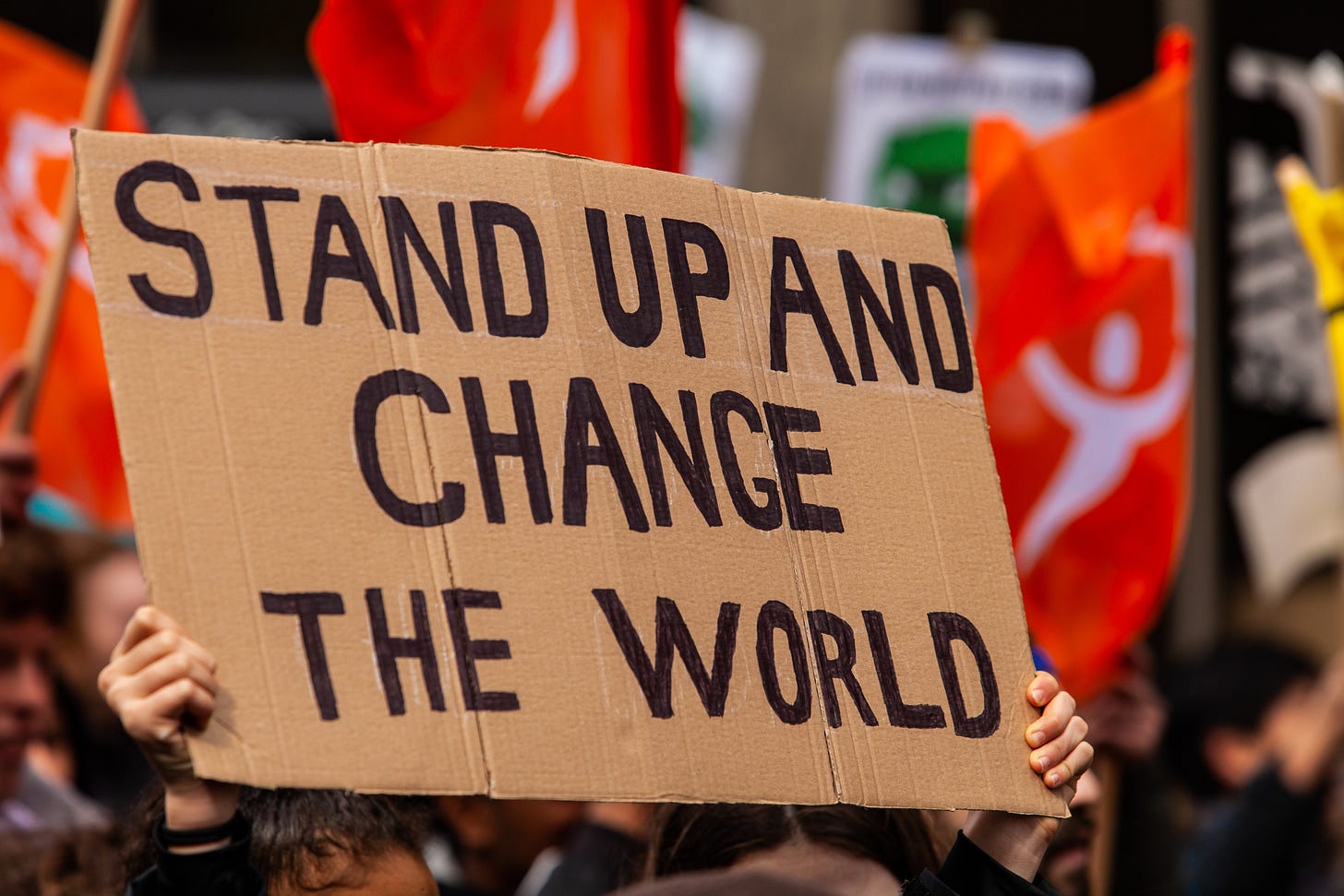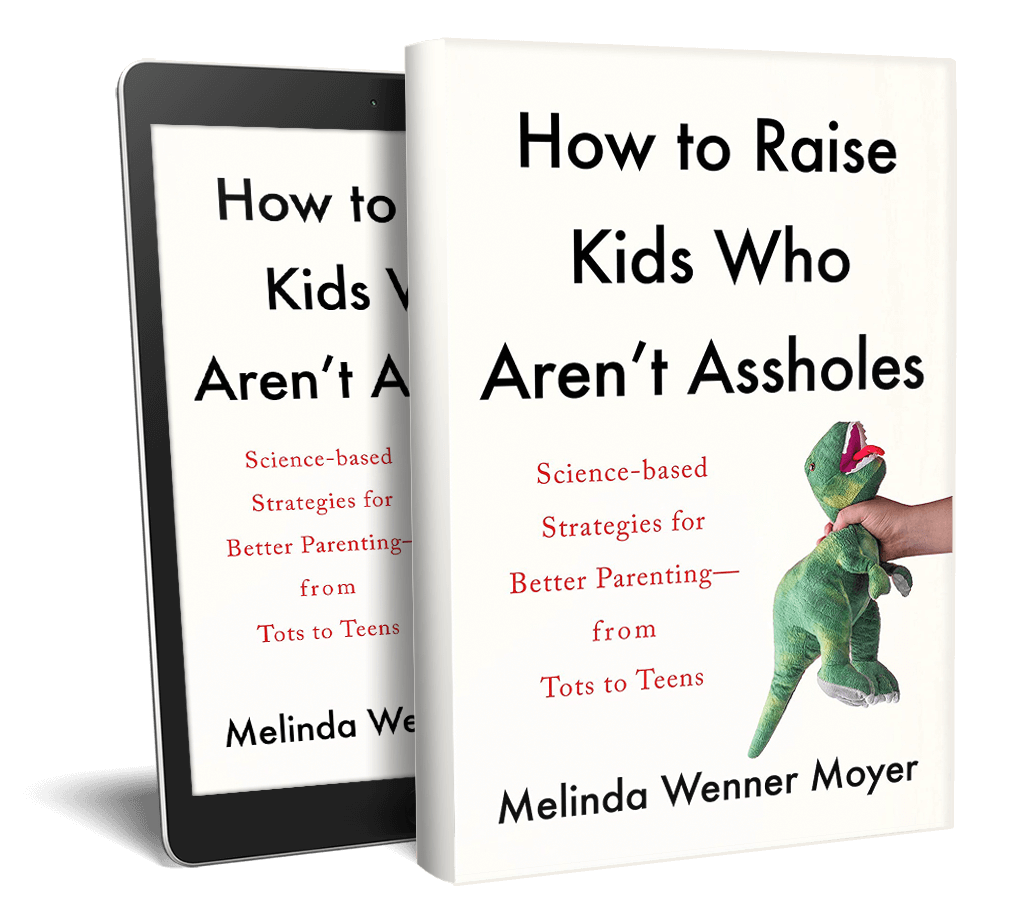What Busy Parents Can Do to Change the World
How to fight for social change with limited time and resources.
Greetings, all! I’m home again after a quick trip to San Diego. One kid is back from overnight camp, and the other has just started. So everything is in a state of flux, but I guess that’s summer. I’m trying to embrace the chaos without being wholly consumed by it. Hope you all are hanging in there, too.
A few months ago in a subscriber thread, we had an enlightening discussion about the barriers we face when it comes to getting involved in activism. I learned that many of you want to support social movements, but either you don’t feel you have the time or resources or you feel cynical that anything you do as an individual could make a difference. (Or, all of the above.) I have felt these things, too, believe me.
The thread got me thinking about what makes activism successful and whether our cynicism is warranted, so I did some research and read the book How Change Happens: Why Some Social Movements Succeed While Others Don’t, by Leslie R. Crutchfield, the Executive Director of the Global Social Enterprise Initiative (GSEI) at Georgetown University’s McDonough School of Business. This illuminating book dissects the factors that drive some social movements to succeed and others to fail.
After finishing it, though, I had more questions. I wondered: What are the most effective ways for busy parents to get involved in social movements, to maximize their chances of success? Should we give money, go to protests, or volunteer our time — and if so, in what capacity? If there are multiple organizations working in an advocacy space, how can we assess which one would be the most useful to support? So for today’s newsletter, I called Dr. Crutchfield (who happens to be a mom of three) and asked her these questions and more. Much of our conversation focuses on the gun safety (and gun rights) movements, but it can be extrapolated to others. What follows below is an edited transcript.
I realize, of course, that this isn’t “parenting advice.” But I certainly see the issue as parenting-adjacent. I learned from our thread discussion that many of you deeply want to get involved in advocacy, but aren’t sure how, and I wanted to share some helpful insights based on the research. Also, one key way to teach our kids to be engaged citizens is to be engaged citizens ourselves — kids learn from what we do. So by getting involved in the causes we care about, we are making smart parenting choices — and helping to change the world in this generation and the next.
Dr. Crutchfield, I really enjoyed your book. I wanted to talk with you today because my newsletter readers have told me they want to get involved in advocacy. Many of us are extremely upset about the state of the world right now and want to do something to make it better. But at the same time, we’re busy parents, and we don’t have much time — so we wonder, is it even worth it? Can one person with limited time and resources actually make a difference?
Don't assume that your single individual action is meaningless. The power of grassroots movements comes when you have thousands or millions of individual, relatively powerless, people joining together in a common voice and with common goals. You can join a movement and support it by in a couple of ways. You can donate money, for sure. Or you can show up and volunteer and advocate, maybe protest at a rally.
I would say the more effective way, if you're going to show up in person, is to show up at your local town hall or state legislator meetings. You need to make your voice known in the state and city where you live. Because these big marches on Washington — they raise awareness, yes. But have you ever seen a gun rights march on Washington? No, they don't do that. Because change doesn't come from Washington. It comes from the states.
Still, you have to look at this from the perspective of both what is going to be valuable to advance the movement, but also what is valuable for yourself. When I go to the Women's March or the marches in support of racial equity and Black Lives Matter, I feel energized. And there's something to be gotten from your own energy — you are the change, and you get changed by participating. So if going out and marching and protesting fires you up, do that. And it also contributes to the movement.
So it sounds like advocating locally gives you the best bang for your buck, but of course it’s not the only option.
Yes. From my analytical viewpoint, if you only have one thing you can do, I would say advocate locally. And then secondly, vote. You have to vote for policy leaders that are going to support the policies that you want. And if you don't vote and get people showing up, then the other side's going to win. That's what the NRA did so well. Their local advocates showed up at town hall meetings, at state legislators, and said, “We're here and we're going to hold you accountable.” And then they showed up in elections. They got people elected. With any of these really divisive issues, you have to get involved with electoral politics. I can't stress it enough. Vote locally — vote in your congressional and not just the national election.
If you’re interested in supporting a cause where there are multiple players, how should you choose choose which organization to support? How can you tell which one will have the greatest chance of succeeding?
Go to the group that's doing policy advocacy, election work, and has a big grassroots base — because they will have the most power. Of course, you can also give to organizations that don't do that that still are doing great work. But that's where I think it would be best spent.
Are there other meaningful steps people can take that don’t take tons of time or money?
What choices can you make as a consumer that advance your cause? If it's climate, [that might mean] driving electric, driving less, switching to solar, buying sustainable brands. Consumer choices actually add up and matter. Or you can get more sophisticated, like with the gun issue — I have three kids and we buy a lot of sports equipment. When the Parkland shooting happened, that was a major step when companies started taking stands. Dick’s [Sporting Goods] stopped selling assault weapons, and they raised the age at which you could purchase guns in their stores to 21. Walmart did too. Because companies are private sector, they're more nimble. They are ahead of where government is. Support the companies taking these stands.
You can advocate for your consumer choices also where you work. Employee resource groups and employee affinity groups are becoming more vocal. People are saying, “I don't want to work at a company that sells assault weapons.” You can, as an employee of a company, demand that your company change its own policies. And, increasingly, what we're seeing is employee groups pushing companies to come out and take public positions.
Also, how can you use the networks that you already have and advocate for those networks to advance change? So, for instance, if you're part of a faith-based community, a church or synagogue, you can say say, “This [issue] is really important to me. What can our church do?” Or if your kids go to school, you're on the PTA, encourage school leaders to take action. Think about all the networks that you're part of, and how can you advocate through those networks by just even saying “This is important. What is our policy? How can we use the network to advance the cause?”
Social media can be a useful network, too, right?
The example that comes to mind is Shannon Watts — she's the founder of Moms Demand Action. After the 2012 Sandy Hook school shooting massacre, she was outraged. She was horrified. She was a stay-at-home mom in Indianapolis. The first thing she did was she jumped online and Googled, “what's the MADD [Mothers Against Drunk Driving] for gun control?” There was nothing. There was no movement. The biggest gun control organization at that time was Brady Campaign, but it wasn't structured as a membership organization; it’s more of a policy think tank. So Shannon started a Facebook page, and that's what formed Moms Demand Action. That was in 2013. Then they joined up with Mayors Against Illegal Guns to create what we now know as Everytown for Gun Safety.
Again, yes, you are one small, relatively powerless voice. But when you join with others, you get the multiplier effect. It's very counter to the American psyche, which is individualistic and entrepreneurial. But you can't achieve impact without the collective weight of everyone.
You argue in your book that the NRA has been so successful in large part because of the grassroots nature of their work — they have these grassroots “armies” everywhere who show up at local events, speak up to their politicians, and vote to support their cause. The gun safety movement, on the other hand, didn’t have a grassroots element for a long time, until Moms Demand Action and Everytown were founded. I'm curious if you think that these new grassroots movements have a fighting chance to make some real changes.
Yes — but it's going be very hard to undo what the gun rights movement has done. By 2019, Moms Demand Action, through Everytown, had gotten about four million supporters. [Note from MWM: Now their website says they’re up to 10 million.] At the same time, NRA membership has started to fall off a little. So for the first time in recent U.S. history, you have an equal, if not larger, volume of grassroots mobilization happening on the gun control side. And that is different. That is different. That wasn't the case in 2015. It certainly wasn't the case back in 2003, when the federal assault weapons ban was allowed to expire. If the momentum can continue to grow, and people not only advocate for policies but votes, and put elected people in office that will do something about guns, and show them that they will keep them in office by turning out voters, then yeah — I actually believe that the policy pendulum could swing back.
For last week’s New York Times Well newsletter, I shared reassuring exercise insights for when you’re feeling low on motivation — like that you can get big benefits from small amounts of physical activity, that it’s fine to only work out on the weekends, and more. Read it here.




